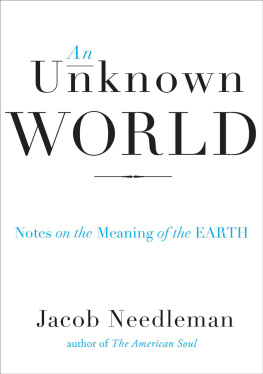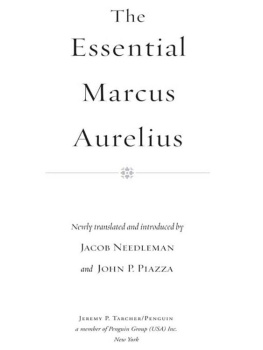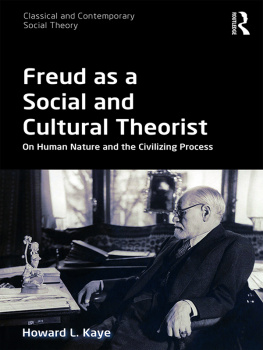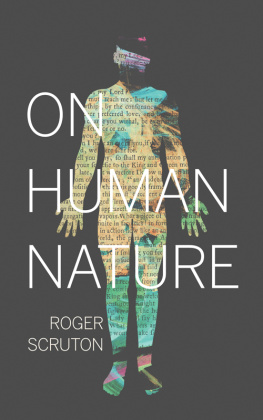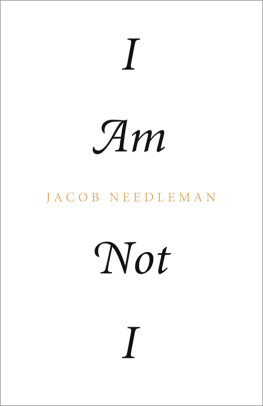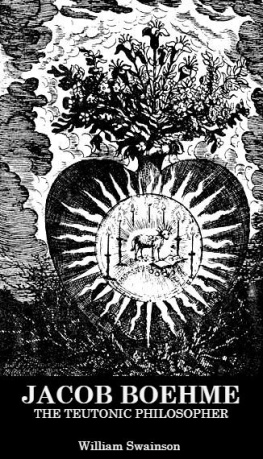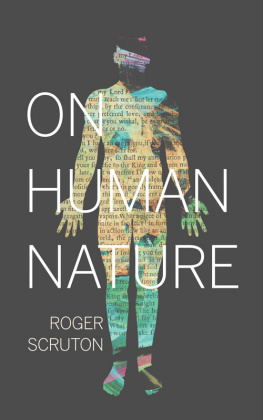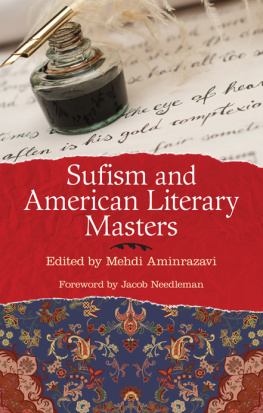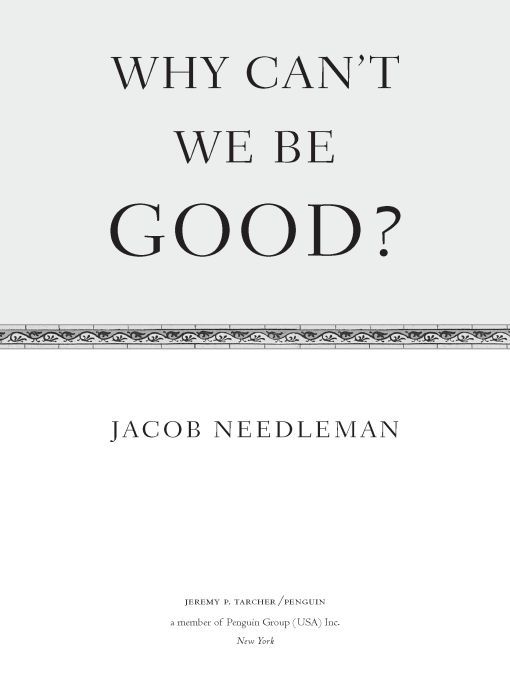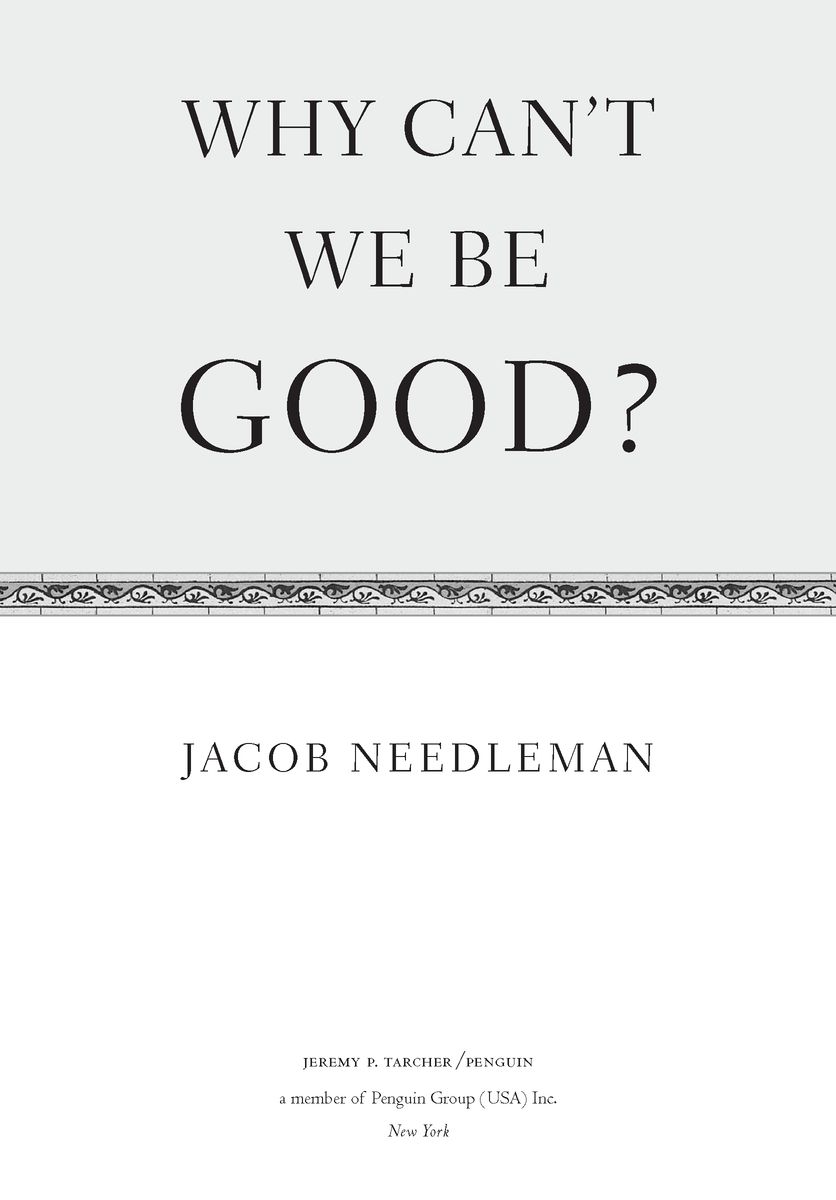Table of Contents
ALSO BY JACOB NEEDLEMAN
The American Soul
Time and the Soul
The Wisdom of Love
Money and the Meaning of Life
The Heart of Philosophy
Lost Christianity
The Way of the Physician
A Sense of the Cosmos
The Indestructible Question
The Sword of Gnosis (editor)
Sorcerers (a novel)
The New Religions
To my students
He hath shewed thee, O man, what is good; and what doth the
Lord require of thee, but to do justly, and to love mercy, and to
walk humbly with thy God?
MICAH 6:8
For the good that I would I do not; but the evil which I would not, that I do.
ROMANS 7:19
ACKNOWLEDGMENTS
I have many people to thank, starting with those whose generosity with their time, attention and goodwill has allowed me over the years to write this book in an indispensable atmosphere of human warmth: Tonyja Duffield Blakeslee, Maril Blanchard, Christina Florkowski, Richard Hodges, Marc Liotta, Dean Ottati, John Piazza, Gregory Porter, Tanya Silva, Shivanii Singh and Frank Cordes, Sara Swan and Ben Blankinship, Jordan Sudy, David Tan and Alexis Vincent. In the same spirit, I wish to thank those who read this book in varying stages of completion. Their encouragement, suggestions, and criticisms have meant a great deal to me: Rabbi Jack Bemporad, Edward Grieve, Barbara Hart, Nancy Larson, John Miller and Dennis Pence.
I am grateful to Frank Gati who, working with David Tan, has been extraordinarily generous in helping to create a remarkable filmed record of class lectures and discussions.
I am also deeply grateful to Steve Bileca, Paul Druzinsky, Peter Esty and Steve Henrikson for the privilege of working with them to deepen the study of ethics and human life with the students of the Branson School in Ross, California. It has been a revelation to witness the moral passion of these high school students and how it is being met at this exceptional school.
Although the students and librarians named in this book are in varying degrees fictitious, I have tried to portray the essence of what transpired between us as faithfully as possible. I can only hope that what I was able to bring to my students has been to some extent adequate to what they brought to me by their unfailing intellectual honesty and thirst for understanding.
My editor and friend Mitch Horowitz was with me at every stage and phase of the writing of this book. What is a great editor? An impartial critic, an intimate coconspirator, a shelter in a storm, a sounding board, a reality check. Above all, a midwife for whom the process of bringing to birth begins at the moment of conception, and even before. Thank you, Mitch.
As for my wife, Gail, I think of the wise words of Ludwig WittgensteinWhereof one cannot speak, one must remain silentand the even wiser words of the musicologist Victor Zuckerkandl: What we cannot speak of, we can sing. It is impossible to speak well and truly about the nobility of her mind, her heart and her conscience. If I am the author, she has been, day in and day out, the author of the author. If I could sing on this page, that would be my song.
THE ONE QUESTION
It was the question of Socrates.
It was the question of St. Paul.
It is the question that calls to us in the sacred writings of the world, and which defines the pathos of all serious art and literature. It is the well from which the great reformers of mankind draw all their passion.
And now, in this place and time, it cries out to us as clearly and solemnly as Wisdom long ago cried out to man:
She crieth at the gates, at the entrance of the city, at the coming in at the doors....
O ye simple, understand wisdom; and, ye fools, be ye of an understanding heart.
PROVERBS 8:3, 5
The question has taken many forms throughout the ages, but the words that cut through all the worlds and across all the epochs of human history are simply these:
Why do we not do what we know is good?
Why do we do what we hate?
It is the question we never really ask; and it is the only one that can make a difference.
For all the vast religious and ethical literature available to us today, for all the evidence of the futility of violence and hatred in our lives and in the world; for all our efforts to find the help we need; for all our yearning to be men and women capable of love, the question remains:
Why cant we be good?
One
THE FIRST STEP
Woven into the immense tapestry of Judaic story and lore, peopled as it is by vast branching histories of families, kings and nations and by the fierce dramas of war and passion and the thundering justice of God, there exists, as it were, one quaint and tender image whose great importance may easily be overlooked.
Two men, one young and the other old, are facing each other. The younger man is balancing himself on one leg. The other, whom we may picture wearing a modest skullcap, holds his right hand over his heart and halfway extends his left hand, palm down, toward the first man.
The older man is Hillel the Elder, greatest of the rabbinic patriarchs. The place is Jerusalem, sometime in the forty-year period between 30 BC and 10 ADduring the reign of the hated Herod the Great and his son Herod Antipas.
The story in question is from the Talmud and is given there in very few words:
A man approaches Hillel in a nervously defiant attitude. I will embrace Judaism, he says, on the condition that you can teach me the whole of the Torah while I am standing on one foot.
Straightaway, Hillel replies:
What is hateful to you, do not do to your neighbor. That is the whole Torah. All the rest is commentary. Now, go and study.
This is the entire story. We are told nothing further about this man.
Perhaps, pensively lowering his foot, he wonders to himself why he has been told to study. Has he not just been given the essence of the teaching in one simple directive: What is hateful to you, do not do to your neighbor? Could anything be clearer?
And also for us: could anything be clearer? We, too, hear those words, or words like them, and are ready, even eager, to embrace them as a moral ideal. Consciously or semi-consciously, we believe we know what is good. Our only question is whether we will act upon it, whether we will put it into practice. It does not seem to be a matter of study, it seems to be solely a matter of action. What is there to study? And why?
Of course, in some ethical situations we may need access to certain kinds of knowledgescientific or medical information, for example, or the details of someones personal life circumstances. But, once we have done our homework, so we feel, our duty is just to act, just to do the right thing. The moral principle seems simple and clear, whether in the form given by the gentle teacher in the story, or as it was given a few years later by his younger contemporary, Jesus: Love thy neighbor as thyself. So much is obvious, is it not?
Or is the truth of the matter quite different? Is a specific preparation of the mind neededa specific kind of educationbefore one can carry out any serious intention at all, much less an intention involving moral action? And if sowhat kind of education, what kind of


